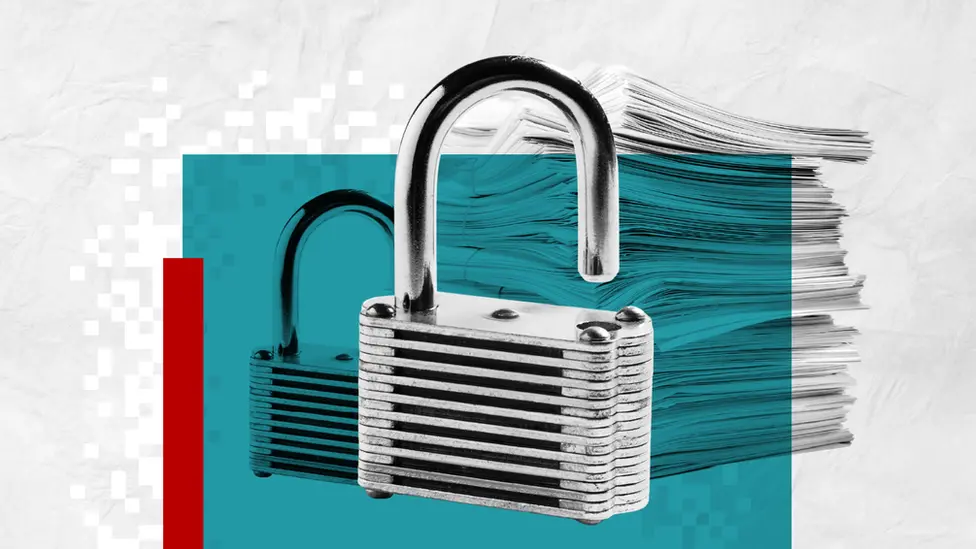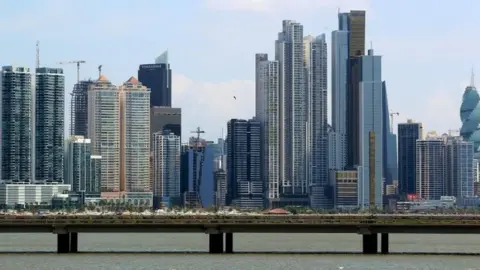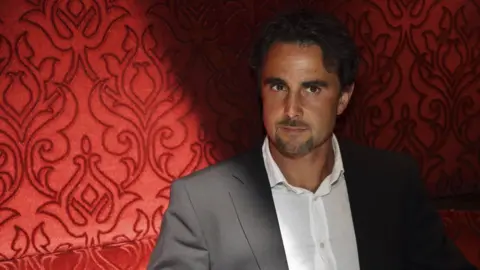Pandora Papers: Your guide to nine years of finance leaks
 BBC
BBCThe financial secrets of hundreds of world leaders, politicians and celebrities has been exposed in another huge leak of financial documents.
Dubbed the Pandora Papers it features almost 12 million files from companies providing offshore services in tax havens around the world.
The data was obtained by the International Consortium of Investigative Journalists (ICIJ) in Washington DC, which has organised the biggest ever global investigation, spanning 117 countries and involving more than 600 journalists. In the UK the investigation has been led by BBC Panorama and the Guardian.
The files are the latest in a series of whistleblower-led investigations that have rocked the world of finance in recent years.
So let's round up the other major leaks of the past decade.
FinCEN Files 2020
In September 2020 the FinCEN Files exposed the failure of major global banks to stop money laundering and financial crime. They also revealed how the UK is often the weak link in the financial system and how London is awash with Russian cash.
The files included more than 2,000 suspicious activity reports (SARs), filed by financial institutions to the Financial Crimes Enforcement Agency, or FinCEN, a part of the US Treasury Department. They also include 17,641 records obtained through Freedom of Information (FOI) requests and other sources.
They were obtained by BuzzFeed News which shared them with the ICIJ and 400 journalists around the world, including BBC Panorama, which led the investigation in the UK.
Paradise Papers 2017
A huge batch of leaked documents mostly from offshore law firm Appleby, along with corporate registries in 19 tax jurisdictions, which revealed the financial dealings of politicians, celebrities, corporate giants and business leaders.
Who was named? The documents contained details about investments made by the Queen's private estate, a tax avoidance scheme used by three stars of BBC sitcom Mrs Brown's Boys and showed that Formula 1 champion Lewis Hamilton avoided tax on his £16.5m luxury jet. They also revealed how Apple protected its low-tax regime by using the Channel Island of Jersey and that Prince Charles campaigned to alter climate-change agreements without disclosing his private estate had an offshore financial interest in what he was promoting.
Who leaked the data? The BBC does not know the identity of the source. The 13.4 million records were passed to German newspaper Süddeutsche Zeitung and then shared with the ICIJ. Panorama led research for the BBC as part of a global investigation involving nearly 100 other media organisations, including the Guardian, in 67 countries.
A confidential settlement was later reached between the BBC, the Guardian and Appleby over the reporting of the leaked documents, which Appleby said were taken by hackers. The Guardian and BBC said the reports were in the public interest but did not give more detail about the settlement.
Panama Papers 2016
Until Pandora this leak was seen as the daddy of them all in data size. If you thought the Wikileaks dump of sensitive diplomatic cables in 2010 was a big deal, this carried 1,500 times more data.
 Getty Images
Getty ImagesThe Panama Papers came about after an anonymous source contacted reporters at German newspaper Süddeutsche Zeitung in 2015 and supplied encrypted documents from the Panamanian law firm Mossack Fonseca. It sells anonymous offshore companies that help the owners hide their business dealings.
Overwhelmed by the scale of the dump, which eventually grew to 2.6 terabytes of data, the Süddeutsche Zeitung called in the ICIJ, which led to the involvement of about 100 other partner news organisations, including the BBC's Panorama.
After more than a year of scrutiny, the ICIJ and its partners jointly published the Panama Papers on 3 April 2016, with the database of documents going online a month later.
Who was named? Where do we start? A few of the news partners focused on how associates of Russian President Vladimir Putin shuffled cash around the globe. Not that the Russians cared much. The prime ministers of Iceland and Pakistan came to far stickier ends, the former quitting and the latter being thrown out of office by the Supreme Court. Overall the financial dealings of a dozen current and former world leaders, more than 120 politicians and public officials and countless billionaires, celebrities and sports stars were exposed.
Who leaked the data? John Doe. Yes, we know. It's not a real name. In US crime series it is mostly used to label anonymous victims but Mr (or Ms) Doe's manifesto, released a month after publication, reveals a self-styled revolutionary. The real identity is still unknown.
 EPA
EPAFive months after the Panama Papers, the ICIJ published revelations from the Bahamas corporate registry. The 38GB cache revealed the offshore activities of "prime ministers, ministers, princes and convicted felons", it said. Former EU competition commissioner Neelie Kroes admitted an "oversight" in failing to disclose her interest in an offshore company.
Swiss leaks 2015
This ICIJ investigation, involving hundreds of journalists from 45 countries, including BBC Panorama, went public in February 2015.
It focused on HSBC Private Bank (Suisse), a subsidiary of the banking giant, and so lifted the lid on dealings in a country where banking secrecy is taken for granted.
The leaked files covered accounts up to the year 2007, linked with more than 100,000 individuals and legal entities from more than 200 countries.
The ICIJ said the subsidiary had served "those close to discredited regimes" and "clients who had been unfavourably named by the United Nations".
HSBC admitted that the "compliance culture and standards of due diligence" at the subsidiary at the time were "lower than they are today".
Who was named? The ICIJ said HSBC had profited from "arms dealers, bag men for Third World dictators, traffickers in blood diamonds and other international outlaws".
It also cited those close to the regimes of former Egyptian President Hosni Mubarak, former Tunisian President Ben Ali and Syrian leader Bashar al-Assad.
 Reuters
ReutersWho leaked the data? Actually, we know this one. The ICIJ investigation was based on data originally leaked by the French-Italian software engineer and whistleblower Hervé Falciani, though the ICIJ got it later from another source. From 2008 onwards he passed information on HSBC Private Bank (Suisse) to French authorities, who in turn passed them to other relevant governments. Mr Falciani was indicted in Switzerland. He was held in detention in Spain but was later released and now lives in France.
Luxembourg leaks 2014
Or LuxLeaks for short. Another extensive ICIJ investigation, which revealed its findings in November 2014.
It centred on how professional services company PricewaterhouseCoopers helped multinational companies gain hundreds of favourable tax rulings in Luxembourg between 2002 and 2010.
The ICIJ said multinationals had saved billions by channelling money through Luxembourg, sometimes at tax rates of less than 1%. One address in Luxembourg was home to more than 1,600 companies, it said.
The leak of documents was first exposed in 2012 after a joint investigation between Panorama and France2 which lifted the lid on the tax agreements of UK pharmaceutical giant GlaxoSmithKline and media company Northern & Shell.
Who was named? Pepsi, IKEA, AIG and Deutsche Bank were among those named.
A second tranche of leaked documents said the Walt Disney Co and Skype had funnelled hundreds of millions of dollars in profits through Luxembourg subsidiaries. They and the other firms denied any wrongdoing.
Jean-Claude Juncker had been PM of Luxembourg when it enacted many of its tax avoidance rules. He had been appointed president of the European Commission just a few days before the leak came out. He said he had not encouraged avoidance.
Eurosceptics went to town and pushed a censure motion against him and his commission. It was rejected. But the EU did investigate, and by 2016 had proposed a yet-to-be realised common tax scheme for the EU.
Who leaked the data? Frenchman Antoine Deltour, a former PricewaterhouseCoopers employee, was the main man, saying he had acted in the public interest. Another PwC employee, Raphael Halet, helped him.
 AFP/ Getty Images
AFP/ Getty ImagesThe pair, along with journalist Edouard Perrin, were all charged in Luxembourg after a PwC complaint. A first verdict was later revisited, watering down sentences, with Deltour given a six-month suspended jail term which was later quashed. Halet received a small fine and Mr Perrin was acquitted.
The offshore leaks 2012-2013
This was about a tenth of the size of the Panama Papers but was seen as the biggest exposé of international tax fraud ever when the ICIJ and its news partners went public in November 2012 and April 2013.
Some 2.5 million files revealed the names of more than 120,000 companies and trusts in hideaways such as the British Virgin Islands and the Cook Islands.
BBC Panorama exposed a flourishing tax evasion industry in the UK in an undercover investigation based on the files.
Who was named? The usual suspects. A mix of politicians, government officials and their families, with the Russians notable, but also those in China, Azerbaijan, Canada, Thailand, Mongolia and Pakistan. The Philippines - in the form of the family of late strongman Ferdinand Marcos - get a dishonourable mention. To be fair, the ICIJ does point out that the leaks are not necessarily evidence of illegal actions.
Who leaked the data? The ICIJ cites "two financial service providers, a private bank in Jersey and the Bahamas corporate registry" as the sources, but says nothing more other than it was "data obtained".

The Pandora Papers is a leak of almost 12 million documents and files exposing the secret wealth and dealings of world leaders, politicians and billionaires. The data was obtained by the International Consortium of Investigative Journalists in Washington DC and has led to one of the biggest ever global investigations.
More than 600 journalists from 117 countries have looked at the hidden fortunes of some of the most powerful people on the planet. BBC Panorama and the Guardian have led the investigation in the UK.
Pandora Papers coverage: follow reaction on Twitter using #PandoraPapers, in the BBC News app, or watch Panorama on the BBC iPlayer (UK viewers only)
